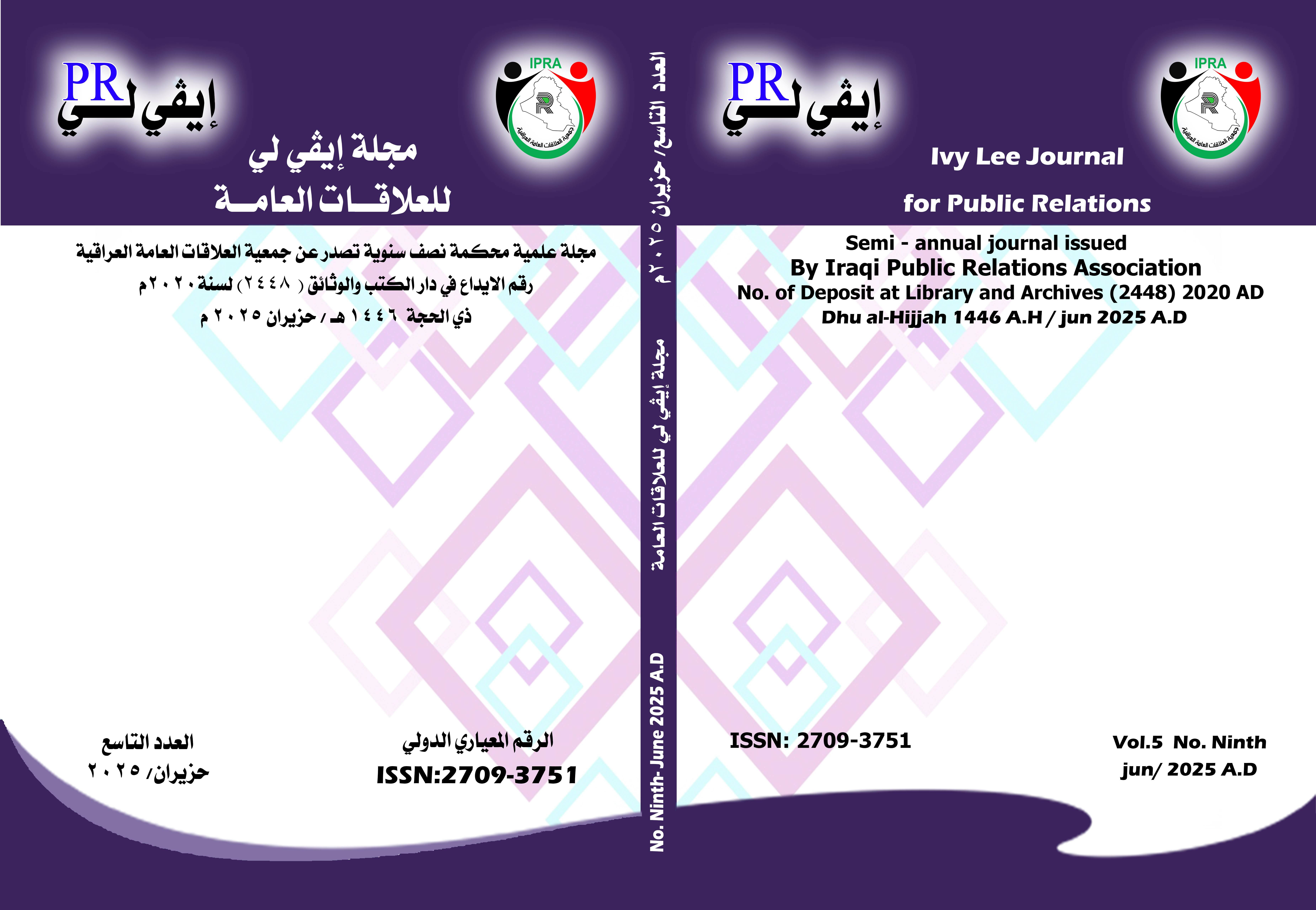Abstract
The study aims to understand the Iraqi public\\'s attitudes toward social issues posted on social media، specifically Facebook. It raises questions about the content of comments، whether they are negative or positive، whether they indicate respect for other opinions، or the opposite، whether the public engages in dialogue through comments، whether they offer solutions to posted issues، or whether they simply view them. The researcher selected five social issues، which revolved around magic practiced in cemeteries، honoring parents، a murder، an elderly woman working to support herself، and managing household affairs.
The total number of comments on these posts reached 1،047، from which the researcher selected 156 comments، based on a systematic random sample، representing 14% of the research sample.
The researcher followed a content analysis approach، revealing 59 main categories، with 516 repetitions. One of the most important findings was that the public dealt with issues by resorting to God Almighty، praying against the oppressors and supporting the oppressed. They also blamed themselves for voting for untrustworthy candidates in elections. They also accused the government of failure and corruption. Some comments directed insults and curses، holding it responsible for murders and other incidents. Furthermore، the public volunteered to provide information about serious incidents without any sense of responsibility for the seriousness of revealing this information publicly. The public was also eager to know the causes of crimes or incidents.
The total number of comments on these posts reached 1،047، from which the researcher selected 156 comments، based on a systematic random sample، representing 14% of the research sample.
The researcher followed a content analysis approach، revealing 59 main categories، with 516 repetitions. One of the most important findings was that the public dealt with issues by resorting to God Almighty، praying against the oppressors and supporting the oppressed. They also blamed themselves for voting for untrustworthy candidates in elections. They also accused the government of failure and corruption. Some comments directed insults and curses، holding it responsible for murders and other incidents. Furthermore، the public volunteered to provide information about serious incidents without any sense of responsibility for the seriousness of revealing this information publicly. The public was also eager to know the causes of crimes or incidents.
Keywords
Audience feedback، social issues، Audience studies، Trends، social media.
Abstract
تهدف الدراسة إلى فهم اتجاهات الجمهور العراقي نحو القضايا الاجتماعية المنشورة على مواقع التواصل الاجتماعي، وتحديدًا فيسبوك. وتطرح الدراسة تساؤلات حول محتوى التعليقات، سواءً أكانت سلبية أم إيجابية، وهل تُعبر عن احترام الرأي الآخر أم لا، وهل يُشارك الجمهور في الحوار من خلال التعليقات، أم أنها تُقدم حلولًا للقضايا المنشورة، أم أنها تُشاهدها فقط. اختار الباحث خمس قضايا اجتماعية، تمحورت حول ممارسة السحر في المقابر، وبر الوالدين، وجريمة قتل، وامرأة مُسنة تعمل لإعالة نفسها، وإدارة شؤون المنزل.
بلغ إجمالي التعليقات على هذه المنشورات 1047 تعليقًا، اختار الباحث منها 156 تعليقًا، بناءً على عينة عشوائية منتظمة، تُمثل 14% من عينة البحث.
اتبع الباحث منهج تحليل المحتوى، كاشفًا عن 59 فئة رئيسية، بتكرار 516 مرة. ومن أهم النتائج التي توصل إليها، أن الجمهور تعامل مع القضايا باللجوء إلى الله تعالى، والدعاء على الظالم، ونصرة المظلوم. كما لاموا أنفسهم على تصويتهم لمرشحين غير جديرين بالثقة في الانتخابات، واتهموا الحكومة بالفشل والفساد. ووجهت بعض التعليقات إهانات وشتائم، محملةً إياها مسؤولية جرائم قتل وحوادث أخرى. علاوة على ذلك، تطوّع الجمهور لتقديم معلومات عن حوادث خطيرة دون أي شعور بالمسؤولية تجاه جدية الكشف عنها علنًا. كما كان الجمهور متلهفًا لمعرفة أسباب الجرائم أو الحوادث.
بلغ إجمالي التعليقات على هذه المنشورات 1047 تعليقًا، اختار الباحث منها 156 تعليقًا، بناءً على عينة عشوائية منتظمة، تُمثل 14% من عينة البحث.
اتبع الباحث منهج تحليل المحتوى، كاشفًا عن 59 فئة رئيسية، بتكرار 516 مرة. ومن أهم النتائج التي توصل إليها، أن الجمهور تعامل مع القضايا باللجوء إلى الله تعالى، والدعاء على الظالم، ونصرة المظلوم. كما لاموا أنفسهم على تصويتهم لمرشحين غير جديرين بالثقة في الانتخابات، واتهموا الحكومة بالفشل والفساد. ووجهت بعض التعليقات إهانات وشتائم، محملةً إياها مسؤولية جرائم قتل وحوادث أخرى. علاوة على ذلك، تطوّع الجمهور لتقديم معلومات عن حوادث خطيرة دون أي شعور بالمسؤولية تجاه جدية الكشف عنها علنًا. كما كان الجمهور متلهفًا لمعرفة أسباب الجرائم أو الحوادث.
Keywords
ردود فعل الجمهور، القضايا الاجتماعية، دراسات الجمهور، الاتجاهات، وسائل التواصل الاجتماعي.
